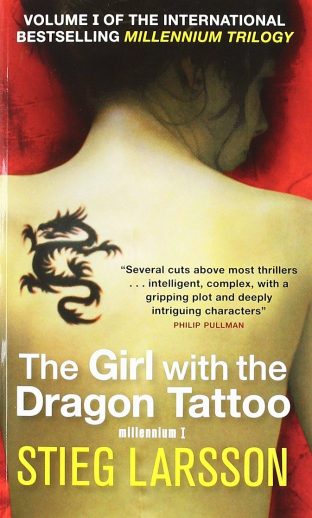I want to say a few quick words about Stieg Larsson’s Millennium trilogy (aka The Girl with the Dragon Tattoo and friends).
It took me a while to figure out why I’ve been enjoying these books so much, but I think I’ve finally nailed it.
It’s the characters
So many novels these days are based around damaged, cheerless, self-obsessed protagonists. The mythos of the anti-hero has taken over modern pop culture and it is making for dire reading. The heroes we follow are so dark they find it hard to crack a smile, or are so mono-dimensional they grin at everything.
The Millennium trilogy’s main characters are different. Here we have a handful of humans who are not just believable, well-drawn, compelling and original, they are also just good people. And that’s what makes these books so strong.
In investigative journalist Mikael Blomkvist and detective Jan Bublanski, for example, we find mature, intelligent and self-assured men. They never strive to outclass or undermine, to control others to achieve their own ends, or manipulate to uphold their reputation. If anything, they seem disinterested in themselves; it is the world around them that captures their curiosity.
The self-awareness they—and others in the series—demonstrate is refreshing, especially in contrast to the Gone Girl genre of unreliable narrators. Yes Millennium’s characters are confident, but they understand they can be wrong and that others can have different and equally valid points of view.
And they are respectful. Even when their emotions make them more difficult to be around, they have enough humility and emotional intelligence to acknowledge it and behave courteously nonetheless. Heck, even the bad guys get their love. Slight them, betray them even, and these main characters can still find room for understanding and redemption.
And they like people. Genuinely and without ulterior motive, they find and express fondness for others. Sometimes it is a sexual thing, but even in this series so overflowing with liberated sexual mores these characters never dominate or control their partners. It is simply mutual attraction and affection. Should someone find reason to cease a relationship, they are farewelled with the same love they entered the relationship with.
But don’t they have flaws?
None of this is should be construed as saying the characters do not have flaws. They don’t always make the decisions we want them to and can be frustratingly stubborn. They can be blinded by personal relationships. And even these moral stalwarts can be tainted by the criminals they battle, sacrificing their ethics for the sake of a broader social outcomes—and sometimes simply to protect someone they care for.
But here’s the key. These negative traits are the flip sides of their strengths, logical extensions of their characters. Larsson hasn’t just invented an interesting quirk or added some peripheral addiction or behavioural tick to an otherwise run-of-the-mill character, he simply expresses the dual side of any personality trait. And through the perspectives of other characters we meet (including the bad guys themselves) we see that even the most humble, respectable, likeable character traits can be perceived as self-serving and pathetic by others.
What about that crazy, raven-haired lassie? You know, the one with the tattoo of the something-or-other?
I’ve yet to mention the titular character, Lisbeth Salander. In Salander Larsson has created a singularly damaged and somewhat psychotic young woman, someone I found off-putting throughout the first book. But she grows on you. This young woman demonstrates such consistency of ethics (even if the way she acts on them can be a tad deranged) that you can’t help but begrudgingly respect her. Her self-protective streak can be a little repellent at times, but that same passion extends to those she cares for, and that is admirable.
She is a flighty, damaged, brooding little sparrow. But she is on a growth trajectory. This is such a stark difference to the dead-end anti-heroes who have decided to wallow in their own darkness.
So why are you telling me this?
I’m sure you’ve picked up on my bias. I am sick of self-tortured characters. A tormented history and a few personality quirks do not equate to an interesting or complex protagonist.
Characters in books, movies, and TV shows are a reflection of society. If our protagonists are upstanding and moral, that is the standard we expect of our fellow citizens – and ourselves. If we portray them as unreliable and self-indulgent, then perhaps that is what we end up aspiring to.
Good characters inspire us to be better. I certainly don’t want to be any of the characters in the Millennium trilogy, but I do respect their positive traits.
Maybe, if I’m lucky, by reading about these good people I might just end up a little better myself.
[Quick note: I haven’t seen the movies. I have no idea how the characters are portrayed on screen.]
BONUS SECTION
Stieg Larsson was a fascinating man. A feminist and harsh critic of violence against women, Stieg was an investigative journalist whose life mission appears to have been making up for a rape he witnessed his friends commit when he was fifteen. His liberal values, positive view of humanity and negative view of society shine through the characters in his books.
He died of a heart attack before his books were published.



Thank you so much Matt. You have given me so much about this series. I am going to read it again. I enjoyed hearing about the author.
Thanks for the message, Judith. I have heard that books four and five in the series – written by David Lagercrantz but in Larsson’s style – don’t have the same magic. I will have to check them out for myself at some point…